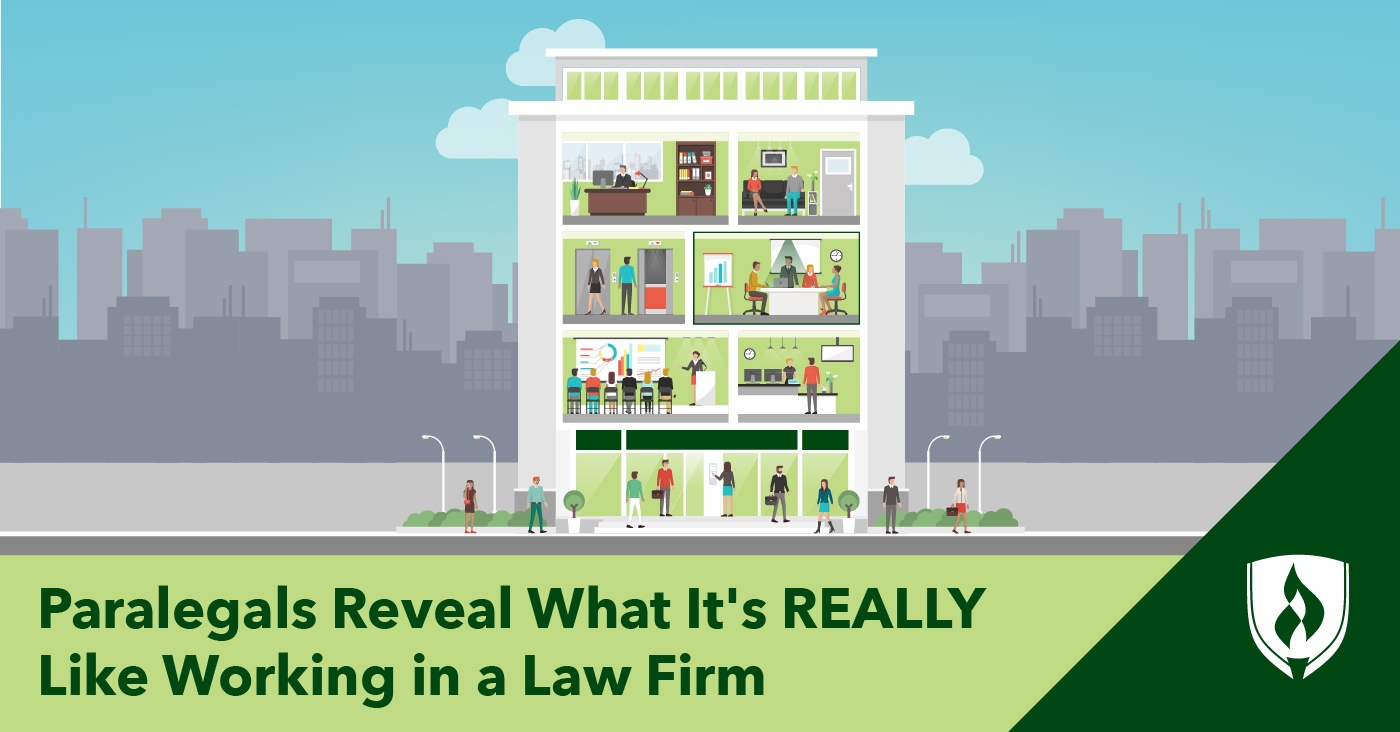
You think you have a pretty good idea of what it would be like to experience a day in the life of a paralegal. After all, you’ve spent years watching legal dramas. TV portrayals of working in an intense, high-pressure law firm are probably accurate ... right?
If you’re considering a career as a paralegal, you need better answers to the question “What does a paralegal do?” than what you’ve seen on shows like Suits and The Good Wife. We connected with real-life paralegals to get the scoop on what it’s really like working in a law firm—the good, the not-so-great and everything in between.
Join us as we get all the juicy details about this legal career, straight from paralegals working for different types of law firms who have seen it all. Once you’ve read their testimonies, you’ll be able to decide for yourself if a paralegal career is right for you.
What does a paralegal actually do?
Most people think of paralegals as an assistant to attorneys. What you may not realize is that the job description can vary widely depending on the type and size of law firm a paralegal works for.
“Being a paralegal can be very different depending on what kind of law your law firm handles,” says Yaritza Tinoco Carlson, a paralegal with The Lovely Law Firm. The bottom line is that paralegals support attorneys as they work with clients and prepare for cases to go to court. That support can look like the stereotypical administrative tasks most people picture paralegals taking on, but some attorneys may also ask their paralegals to perform more in-depth legal work.
“Firms, and even individual attorneys within those firms, utilize paralegals differently,” says Sean Petersen, a paralegal at full-service law firm Fennemore Law. Some firms do stick to using paralegals for “limited purposes,” including administrative tasks, like organizing documents. “Other attorneys, including the ones with whom I’ve been fortunate enough to work, allow their paralegals to grow and take on more complicated tasks and projects.”
Emily Stoerkel, a paralegal with criminal law practice Joslyn Law Firm, adds that some paralegals also have the opportunity to focus on more specialized areas. “Some paralegals work predominantly with researching case law to form legal arguments while others may sit in client meetings all day transcribing depositions,” Stoerkel says.
What are some of a paralegal’s job duties?
You can already see that the paralegal career involves more options than you may have imagined. But what do their daily tasks involve? We consulted the Bureau of Labor Statistics (BLS) as well as the paralegals we spoke to and compiled this list of job duties paralegals are likely to encounter:1
Administrative paralegal job duties
- Drafting correspondence
- Preparing and filing motions to the court
- Reviewing deadlines and scheduling events with attorneys and clients
- Organizing and filing documents
- Writing or summarizing reports for attorneys
Client-focused paralegal job duties
- Speaking with new clients to gather the details of their case
- Updating existing clients on their case
- Requesting documents from clients
- Communicating with clients on behalf of the attorney on their case
- Scheduling interviews with clients, witnesses and other attorneys
Analytical paralegal job duties
- Conducting research on relevant laws and regulations
- Reviewing and investigating documents obtained through discovery
- Analyzing documents from clients or from discovery
- Reviewing trial transcripts
- Assisting with trial preparation and case strategy
What’s the work environment of a law firm really like?
Is working in a law firm really as stressful and intense as Hollywood makes it out to be? The exact answer depends on the type of firm you work for, but generally speaking, no.
Some areas of law tend to be a bit more high pressure than others, such as litigation and criminal defense, while others are prone to more regular hours. For example, Petersen reveals that it’s common in litigation law for paralegals to work long hours, while Tinoco Carlson shares that she’s usually able to accomplish her tasks as a workers’ compensation paralegal during normal business hours. Other legal fields, like tax or finance law, may have busy seasons depending on tax deadlines and the end of a corporation’s fiscal year.
However, many factors play into a paralegal’s schedule, including how much time a firm is given to work on a case before a court date and how well organized and efficient a paralegal is.
“There can naturally be long hours and busy seasons in criminal defense, but the key to success for any paralegal is organization,” Stoerkel says, sharing that many of her long workdays have stemmed not from high-stakes cases or pressure from attorneys but because of time-management issues.
“The key to success is to stay organized and plan ahead!” Stoerkel says.
Is it boring to be a paralegal?
Working as a paralegal isn’t always filled with drama—but that doesn’t mean it’s boring! All our paralegals agree that there is no typical day in this profession. Individual clients and cases will always differ, making every day unique. “We have a variety of cases that help keep it interesting and fresh,” Petersen says.
“Every client has a different story,” Tinoco Carlson says. “Every task you handle is different in its own way.”
In fact, communicating with clients may be one of the best parts of the job for some paralegals. “It is very rewarding to be able to help people who are in need,” Tinoco Carlson says. “This job will teach you all sorts of new things every day and will never be boring—I can promise you that.”
Though there are many variables to what it’s really like working in a paralegal career, one thing is for certain: There’s plenty of room for you to cater to your interests and carve your own path.
“The job can always change, and paralegals are always needed, so it is important to try and find areas of law that interest you,” Stoerkel says. “The paralegal career opens the door to the entire practice of law, so try new things when you can and never hold yourself back because you do not like one area.”
Intrigued by the legal field?
A day in the life of a paralegal isn’t quite like it appears on TV—but that isn’t necessarily a bad thing! Now that you’ve seen the opportunities that can come from working in a law firm, you might be wondering how to get started as a paralegal yourself.
We’ve got you covered with our article “How to Become a Paralegal: 4 Steps to Start Your Legal Career.” Take a look to learn how you can begin forging your own path in the legal field!
1Bureau of Labor Statistics, U.S. Department of Labor, Occupational Outlook Handbook, [April, 2021] https://www.bls.gov/ooh/legal/paralegals-and-legal-assistants.htm . Information represents national, averaged data for the occupations listed and includes workers at all levels of education and experience. This data does not represent starting salaries. Employment conditions in your area may vary




